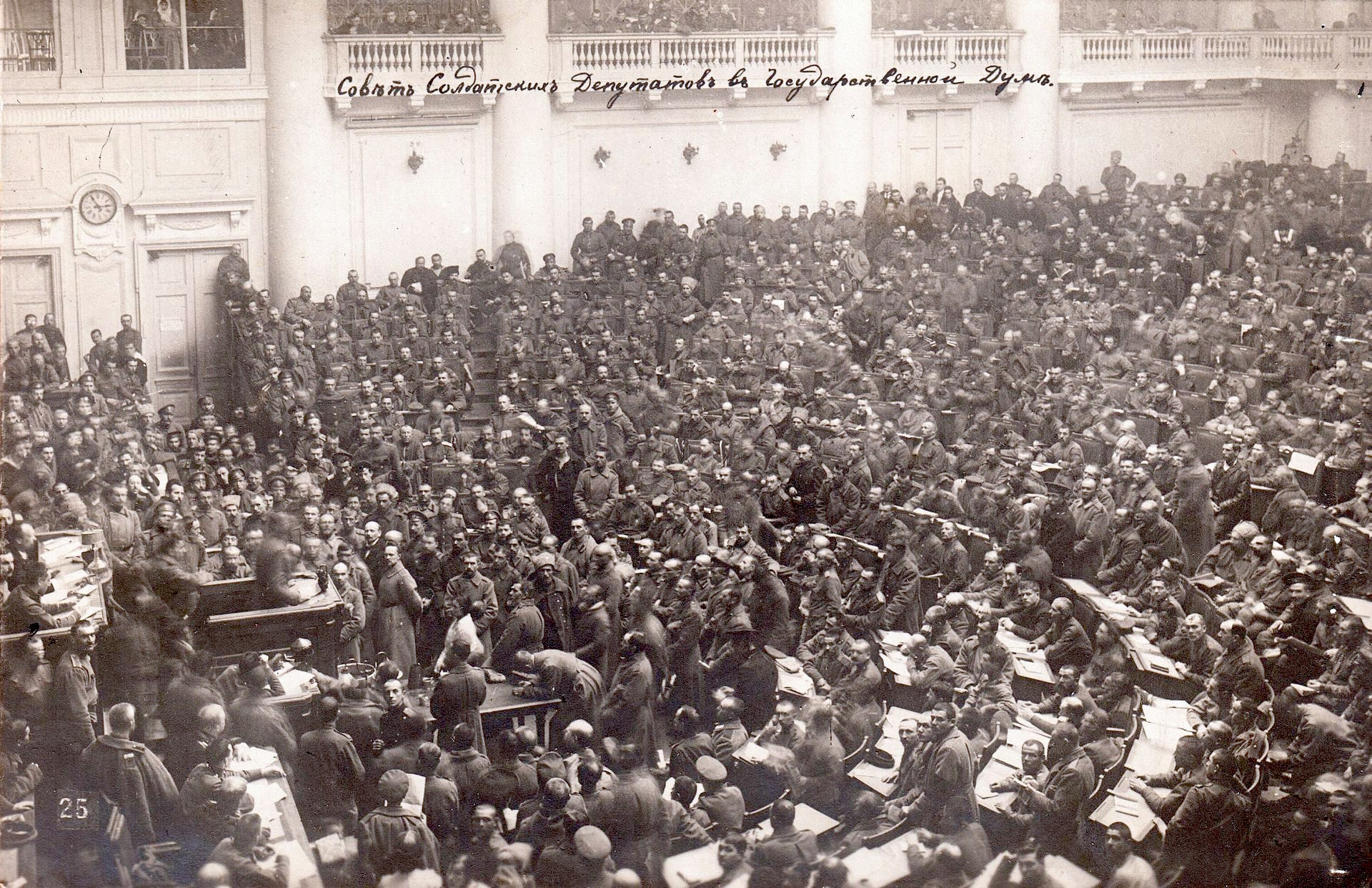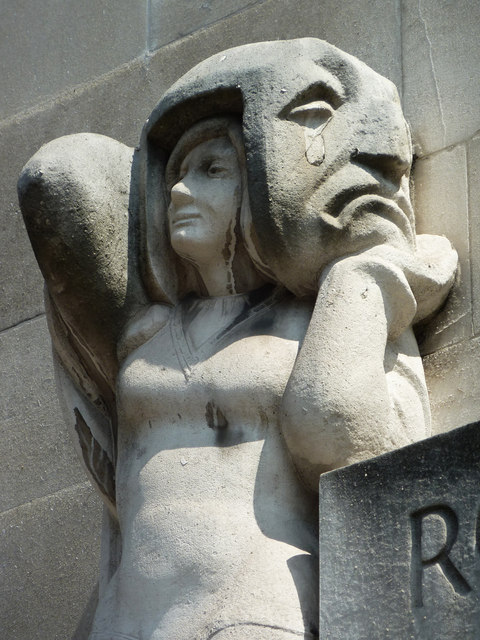|
Soviet (council)
A soviet (, , ) is a workers' council that follows a socialist ideology, particularly in the context of the Russian Revolution. Soviets were the main form of government in the Russian SFSR and the Makhnovshchina. The first soviets were established during the 1905 Revolution in the late Russian Empire. In 1917, following the February Revolution, a state of dual power emerged between the Russian Provisional Government and the soviets. This ended later that year with the October Revolution, during which the Second Congress of Soviets proclaimed itself as the supreme governing body of the country. Because soviets gave the name to the later Soviet Union, they are frequently associated with the state's establishment. However, the term may also refer to any workers' council that is socialist, such as the Irish soviets. Soviets do not inherently need to adhere to the ideology of the Soviet Union. Etymology "Soviet" is derived from a Russian word meaning council, assembly, advi ... [...More Info...] [...Related Items...] OR: [Wikipedia] [Google] [Baidu] |
Moldovan Cyrillic Alphabet
The Moldovan Cyrillic alphabet is a Cyrillic alphabet designed for the Romanian language spoken in the Soviet Union ( Moldovan) and was in official use from 1924 to 1932 and 1938 to 1989 (and still in use today in the breakaway Moldovan region of Transnistria). History Until the 19th century, Romanian was usually written using a local variant of the Cyrillic alphabet. A variant based on the reformed Russian civil script, first introduced in the late 18th century, became widespread in Bessarabia after its annexation to the Russian Empire, while the rest of the Principality of Moldavia gradually switched to a Latin-based alphabet, adopted officially after its union with Wallachia that resulted in the creation of Romania. Grammars and dictionaries published in Bessarabia before 1917, both those that used the label "Moldovan" and the few that used "Romanian", used a version of the Cyrillic alphabet, with its use continuing in Bessarabia even after the 1918 union, in order to ma ... [...More Info...] [...Related Items...] OR: [Wikipedia] [Google] [Baidu] |
Moscow
Moscow is the Capital city, capital and List of cities and towns in Russia by population, largest city of Russia, standing on the Moskva (river), Moskva River in Central Russia. It has a population estimated at over 13 million residents within the city limits, over 19.1 million residents in the urban area, and over 21.5 million residents in Moscow metropolitan area, its metropolitan area. The city covers an area of , while the urban area covers , and the metropolitan area covers over . Moscow is among the world's List of largest cities, largest cities, being the List of European cities by population within city limits, most populous city entirely in Europe, the largest List of urban areas in Europe, urban and List of metropolitan areas in Europe, metropolitan area in Europe, and the largest city by land area on the European continent. First documented in 1147, Moscow became the capital of the Grand Principality of Moscow, which led the unification of the Russian lan ... [...More Info...] [...Related Items...] OR: [Wikipedia] [Google] [Baidu] |
Ivanovo
Ivanovo (, ) is a types of inhabited localities in Russia, city in Russia and the administrative center and largest city of Ivanovo Oblast, located northeast of Moscow and approximately from Yaroslavl, Vladimir, Russia, Vladimir and Kostroma. Ivanovo has a population of 361,644 as of the 2021 Census, making it the List of cities and towns in Russia by population, 50th largest city in Russia. Until 1932, it was previously known as ''Ivanovo-Voznesensk''. It is the youngest city of the Golden Ring of Russia. The city lies on the Uvod River, in the centre of the eponymous oblast. Ivanovo gained city status in 1871, emerged as a major center for textile production, and began to be referred to as the "Russian Manchester". The city is served by Ivanovo Yuzhny Airport. Geography The Uvod River, a tributary of the Klyazma River, Klyazma, flows from north to south, dividing the city into two halves. There are also two rivers in Ivanovo: the Talka River, Talka and the Kharinka River, K ... [...More Info...] [...Related Items...] OR: [Wikipedia] [Google] [Baidu] |
Soviet Historiography
Soviet historiography is the methodology of history studies by historians in the Soviet Union (USSR). In the USSR, the study of history was marked by restrictions imposed by the Communist Party of the Soviet Union (CPSU). Soviet historiography is ''itself'' studied in modern historiography. Theoretical approaches George M. Enteen identifies two approaches to the study of Soviet historiography. A totalitarian approach associated with the Western analysis of the Soviet Union as a totalitarian society, controlled by the Central Committee of the Communist Party of the Soviet Union, this school "thought that signs of dissent merely represented a misreading of commands from above."363 For Enteen the other school of writing on Soviet historiography is the social-history school which draws attention to "important initiative from historians at odds with the dominant powers in the field."363 Enteen is unable to decide between these different approaches based on current literature. In Mark ... [...More Info...] [...Related Items...] OR: [Wikipedia] [Google] [Baidu] |
Lev Trotsky 1906-3
Lev or LEV may refer to: People and fictional characters *Lev (given name) * Lev (surname) Places *Lev, Azerbaijan, a village * Lev (crater), a tiny lunar crater Religion *an abbreviation for Leviticus, the third book of the Hebrew Bible and the Torah *Lay eucharistic visitor, an extraordinary minister of Holy Communion approved by a church (usually Episcopalian or Lutheran) to bring Communion to the homebound *Libreria Editrice Vaticana, the Vatican Publishing House Transportation * Leyland Experimental Vehicle, a type of British experimental railbus *Light electric vehicle, an electric bicycle *Low emission vehicle, a motor vehicle that emits relatively low levels of motor vehicle emissions *Lunar Excursion Vehicle, an early name for the Apollo Lunar Module Political and other * Lesser evil voting (LEV) *Lev (political party), a now-defunct political party in Israel *LEV (cable system), a submarine cable system linking countries in the eastern Mediterranean *''Lev!'', a Swe ... [...More Info...] [...Related Items...] OR: [Wikipedia] [Google] [Baidu] |
Rada
The Royal Academy of Dramatic Art, also known by its abbreviation RADA (), is a drama school in London, England, which provides vocational conservatoire training for theatre, film, television, and radio. It is based in Bloomsbury, Central London, close to the Senate House complex of the University of London, and is a founding member of the Federation of Drama Schools. RADA is one of the oldest drama schools in the United Kingdom, founded in 1904 by Sir Herbert Beerbohm Tree. It moved to buildings on Gower Street in 1905. It was granted a royal charter in 1920 and a new theatre was built on Malet Street, behind the Gower Street buildings, which was opened in 1921 by Edward, Prince of Wales. It received its first government subsidy in 1924. RADA currently has five theatres and a cinema. The school's principal industry partner is Warner Bros. Entertainment. RADA offers a number of foundation, undergraduate and postgraduate courses. Its higher education awards are validated ... [...More Info...] [...Related Items...] OR: [Wikipedia] [Google] [Baidu] |
State Council (Russian Empire)
The State Council ( rus, Госуда́рственный сове́т, p=ɡəsʊˈdarstvʲɪn(ː)ɨj sɐˈvʲet) was the supreme state advisory body to the tsar in the Russian Empire. From 1906, it was the upper house of the parliament under the Russian Constitution of 1906. 18th century Early tsars' councils were small and dealt primarily with external politics. Peter I of Russia introduced the Privy Council. Catherine I of Russia introduced the Supreme Privy Council. Its role varied during different reigns. Peter III of Russia created the Imperial Council on 20 May 1762 ("Императорский Совет"), or, formally "The Council at the Highest Court" ("Совет при высочайшем дворе"). It was dismissed shortly after the succession of Catherine II of Russia. 1810–1906 The State Council was established by Alexander I of Russia in 1810 as part of Speransky's reforms. Although envisaged by Speransky as the upper chamber of the Russian parliam ... [...More Info...] [...Related Items...] OR: [Wikipedia] [Google] [Baidu] |
Imperial Russia
Imperial is that which relates to an empire, emperor/empress, or imperialism. Imperial or The Imperial may also refer to: Places United States * Imperial, California * Imperial, Missouri * Imperial, Nebraska * Imperial, Pennsylvania * Imperial, Texas * Imperial, West Virginia * Imperial, Virginia * Imperial County, California * Imperial Valley, California * Imperial Beach, California Elsewhere * Imperial (Madrid), an administrative neighborhood in Spain * Imperial, Saskatchewan, a town in Canada Buildings * Imperial Apartments, a building in Brooklyn, New York * Imperial City, Huế, a palace in Huế, Vietnam * Imperial Palace (other) * Imperial Towers, a group of lighthouses on Lake Huron, Canada * The Imperial (Mumbai), a skyscraper apartment complex in India * Imperial War Museum, a British military museum and organisation based in London, UK * * Imperial War Museum Duxford, an aviation museum in Cambridgeshire, UK * * Imperial War Museum Nort ... [...More Info...] [...Related Items...] OR: [Wikipedia] [Google] [Baidu] |
History Of Russia
The history of Russia begins with the histories of the East Slavs. The traditional start date of specifically Russian history is the establishment of the Rus' people, Rus' state in the north in the year 862, ruled by Varangians. In 882, Prince Oleg of Novgorod seized Kiev, uniting the northern and southern lands of the Eastern Slavs under one authority, moving the governance center to Kiev by the end of the 10th century, and maintaining northern and southern parts with significant autonomy from each other. The state Christianization of Kievan Rus', adopted Christianity from the Byzantine Empire in 988, beginning the synthesis of Byzantine Empire, Byzantine, Slavs, Slavic and Scandinavians, Scandinavian cultures that defined Russia, Russian culture for the next millennium. Kievan Rus' ultimately disintegrated as a state due to the Mongol invasion of Rus', Mongol invasions in 1237–1240. After the 13th century, Moscow emerged as a significant political and cultural force, drivi ... [...More Info...] [...Related Items...] OR: [Wikipedia] [Google] [Baidu] |





